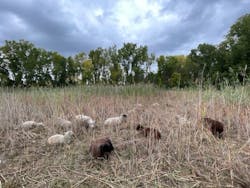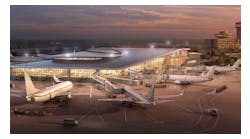Appleton Airport Trusts Sheep Flock to Maintain Conservancy Land
It’s a low-tech solution, environmentally friendly, and all around not a baaaad idea—the Appleton International Airport turned landscaping over to a shepherd this year. A flock of sheep from the nearby Wooly Green Grazers has been trimming vegetation all summer, resulting in significant savings for the airport. The flock will move on to greener pastures in early October when the Wisconsin growing season winds down.
When the airport expands buildings or runways, it is required to replace developments with wetlands and conservancy areas where staffers manage invasive species. Jobs consist of removing brush, getting rid of invasive plants, eradicating weeds, and planting native trees and bushes. In past years the process involved manpower, equipment, and herbicides.
In spring of 2023, staffers thought they could use goats inside the conservancy to reduce and regulate the grass height as well invasive species. A Facebook search uncovered Wooly Green Grazers located down the road from the conservancy area in Appleton. Owner Roxie Emunson counseled that sheep might be a better solution because goats would eat everything, including the recently planted trees.
“We spent about $2500 on trees for the conservancy back in spring,” said Luke Bettis, landside operations supervisor. “If we use chemicals such as herbicides for the invasive species of plants, we could have killed or heavily damaged the trees.”
“Sheep and goats are good for different jobs,” Emunson said. “In this case, sheep were better because they don’t have to be watched. Sometimes goats can be overly curious and break through fences.” In this case her flock camped out on the conservation site overnight and electric fences kept the sheep in and predators out.
That’s when the flock of 20 Old English Southdown sheep and some crossbreeds moved into the conservancy area for grazing. Shepherds moved the sheep around the conservancy land once a week inside a portable electric fence. In that time, the sheep ate all the vegetation in a 2.5 acre area, then moved on to the next region of the land. In addition to keeping the grass short, the sheep removed invasive plant species such as phragmites and buckthorn.
“The sheep mowed all of that down in just a single month without the airport staff having to mow, spray, or even make a trip out there. But more importantly, we were able to deal with invasive weeds in a sustainable manner without herbicides or chemicals,” Bettis said.
Responsible environmental practices are part of the airport’s master plan. “Putting sheep to work for weed control might be a little outside the box, but it’s another example of how we seek continuous improvement and at limit our carbon footprint,” said Abe Weber, Appleton Airport director.
For the airport, the investment was far from getting fleeced.
The cost for transporting the sheep and setting up fencing was about $1500/month. Bettis estimates the cost is about $1,000/month less than using traditional methods, not to mention limiting damage to the newly planted trees which cost an additional $2,500.
The airport already plans to have the sheep back for the 2024 growing season. And as the region’s first “airport shepherd,” Emunson said there are other benefits.
“it’s good for the environment and it’s good for our souls because it’s almost therapeutic to watch them,” Emunson said. “My husband likes to say that we like raising and grazing!”



